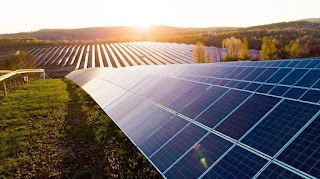The Ultimate Guide to Solar Panels: Benefits, Types, and Maintenance
Harnessing the Power of the Sun: A Comprehensive Guide to Solar Panels
Introduction
Solar power is becoming increasingly popular as more people seek to reduce their carbon footprint and lower their energy bills. One of the most important components of a solar power system is the solar panel, which converts sunlight into electricity. In this comprehensive guide, we will explore everything you need to know about solar panels, including the benefits and drawbacks, the different types of solar panels, how to choose the right solar panel for your needs, and how to maintain your solar panel system for maximum efficiency.
Benefits of Solar Panels
One of the most significant benefits of solar panels is that they can help you save money on your energy bills. Once you have paid for the initial installation, solar power is essentially free, which can help you reduce your monthly energy costs. Additionally, solar panels can increase the value of your home, which is particularly important if you plan to sell your home in the future.
Another significant benefit of solar panels is that they are a clean, renewable source of energy. Unlike fossil fuels, which are finite and contribute to air pollution and climate change, solar power is sustainable and does not produce any harmful emissions. By using solar power, you can reduce your carbon footprint and do your part to protect the planet.
Drawbacks of Solar Panels
While solar panels offer many benefits, there are also some drawbacks to consider. One of the main drawbacks is the initial cost of installation. While the cost of solar panels has decreased in recent years, it can still be a significant investment upfront. However, it's important to remember that the cost of solar panels will likely pay for itself over time in energy savings.
Another potential drawback of solar panels is that they require some maintenance. For example, solar panels need to be cleaned regularly to ensure maximum efficiency. However, the maintenance required for solar panels is generally low compared to other home appliances and can be easily managed with proper care.
Types of Solar Panels
There are three main types of solar panels: monocrystalline, polycrystalline, and thin-film. Each type has its own advantages and disadvantages, and choosing the right type of solar panel for your needs will depend on several factors, including your budget, the amount of sunlight your home receives, and the size of your roof.
Monocrystalline solar panels are the most efficient type of solar panel and are made from a single crystal of silicon. They are more expensive than other types of solar panels but also have a longer lifespan and a higher energy output.
Polycrystalline solar panels are made from multiple crystals of silicon and are less expensive than monocrystalline panels. However, they are also less efficient and have a shorter lifespan.
Thin-film solar panels are made from a thin layer of photovoltaic material and are the least expensive type of solar panel. They are also lightweight and flexible, making them ideal for portable applications. However, they are less efficient than other types of solar panels and have a shorter lifespan.
Choosing the Right Solar Panel
When choosing the right solar panel for your needs, there are several factors to consider, including the type of solar panel, the size and orientation of your roof, and the amount of sunlight your home receives. It's also important to consider your budget and the level of energy efficiency you want to achieve.
If you live in an area with high levels of sunlight and have a large roof, monocrystalline solar panels may be the best choice for you. However, if you have a smaller roof or a limited budget, polycrystalline or thin-f
tejadafx1@gmail.com
continue
ilm solar panels may be a better option. Additionally, if you're looking for a portable solar solution, thin-film solar panels may be the best choice.
It's also important to consider the warranty and lifespan of the solar panel. Monocrystalline solar panels typically have a longer lifespan and come with a longer warranty than other types of solar panels. However, it's important to weigh the upfront cost against the long-term benefits to determine which type of solar panel is the best investment for your needs.
Maintaining Your Solar Panel System
Maintaining your solar panel system is important to ensure maximum efficiency and longevity. Here are some tips for maintaining your solar panel system:
Clean your solar panels regularly: Dirty solar panels can reduce efficiency by up to 25%. Clean your solar panels at least once a year, or more frequently if you live in a dusty or dirty environment.
Check for damage: Inspect your solar panels regularly for any damage, such as cracks or breaks. If you notice any damage, contact a professional to repair or replace the panel.
Trim trees and foliage: If trees or other foliage are blocking sunlight from reaching your solar panels, trim them back to ensure maximum sun exposure.
Monitor your energy output: Keep track of your energy output to ensure that your solar panel system is operating at maximum efficiency. If you notice a decrease in energy output, contact a professional to inspect and repair your system.
Conclusion
Solar panels are a clean, renewable source of energy that can help you save money on your energy bills and reduce your carbon footprint. By understanding the benefits and drawbacks of solar panels, the different types of solar panels available, and how to choose the right solar panel for your needs, you can make an informed decision about investing in solar power. With proper maintenance, your solar panel system can provide you with clean, sustainable energy for years to come.






